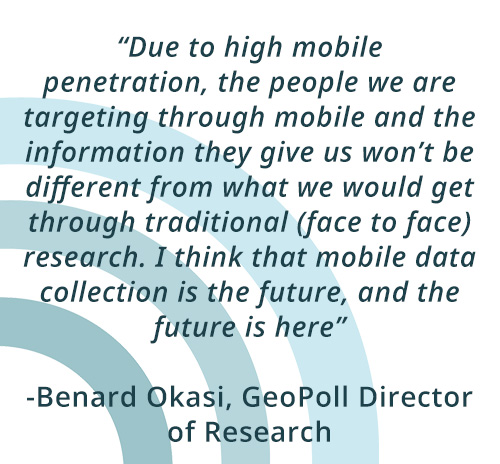- Contents

Benard Okasi Interview
Benard Okasi is GeoPoll’s Director of Research, and oversees GeoPoll’s research team and data outputs. Below is an abbreviated version of a conversation he had with Roxana Elliott, VP Marketing, about his background in research and how the industry is shifting to mobile methods.
Roxana Elliott: Thanks for joining me! Can you start by telling me a bit about your background and where you worked before GeoPoll?
Benard Okasi: Prior to GeoPoll I was at Synovate, a research company that operates in multiple countries – I started there in 2011 and it was later acquired by Ipsos in 2012. At Ipsos I worked in different positions, moving from a research assistant up to a senior research executive. My role was mainly business development, project management and providing insights to clients through reports with actionable insights. Towards the end of 2014, my main focus was on Coca Cola account, and I was placed at Coke as an implant for a year where my main role was to support the client on the projects that were executed by Ipsos for Coke in the then CEWA business unit team.
RE: Why did you first come to GeoPoll and how long have you been here?
BO: While working at Ipsos, the CEO of GeoPoll gave a presentation to research firms in Nairobi about mobile research and where the future of data collection is heading, which is self-completion surveys through mobile, and GeoPoll is here to help bridge the gap. I was curious about the new way GeoPoll was doing data collection through mobile and not having researchers need to go out and collect data in person. I have now been at GeoPoll for 5 years, I first started as a research executive working on data and client support, then managing our partnership relationships with other research agencies, and now leading the research team.
RE: Can you tell me more about the research team and what your responsibilities are?
BO:The research team now is made up of 15 staff, within which we have a data processing team, data analysts, and media analysts. The data processing team does data cleaning, processing and data quality checks. Our data analysts deal with complex analysis of data – for example if clients need significance testing. The media data team looks at audience measurement data and generates actionable insights for our clients. Most of our team members have a research background and have studied statistics hence able to look into data from a statistical point of view and provide complex analysis when required.
RE: What excites you about working for GeoPoll?
BO: What excites me is the team energy and synergy to support clients – when you look at the speed at which we complete projects, with the combined efforts of different departments, we can deliver projects within 2-3 days or a week. We are also able to sit in a central office and collect data in over 50 countries, which shows what the future is in remote data collection. I love the combined effort of the team, and if there are issues in a project we sit down as a team and come up with solutions and the way forward without delays.
RE: How does what we offer at GeoPoll compare to traditional methods in your experience?
BO: If clients go for traditional research, you can only use past data or say old data to inform on their decisions, and what we’ve found at GeoPoll is that most clients want real time information. With mobile research, we can get a set questions from client today and be able to give clients results tomorrow. GeoPoll plays a key role in delivering quality, timely and cost-effective results to clients.
RE: Have you seen a resistance of people moving to mobile research?
There are tracker projects that have been running using traditional research for a long time targeting general population and because mobile data collection only targets a mobile owned population, some clients are resistant to changing the methodology. But markets are changing quickly as mobile penetration has grown over the years – in Kenya I think mobile penetration is over 90%, so that tells you that the people we are targeting through mobile and the information they give us won’t be different from what we would get through traditional (face to face) research. I think that mobile data collection is the future, and the future is here.
RE: Are there any new products you are working on within the research team?
As we continue to drive real-time data delivery to clients, we have made improvements in our systems, including the creation of dashboards which enable us to have more automated systems so we can deliver to clients even quickly. Clients can go directly to a dashboard and pull data and do extra analysis as soon as it’s collected. This innovation around our deliverables will help clients make decisions right away. For some of our larger clients, our team has been able to work on projects in over 30 countries at once, and we’ve created automated processes to deliver quality data regularly for them which has led us to improve our processes over time.
RE: What do you like outside of work?
I love meeting with friends and driving around, and spend most of my time with my family.
RE: Finally, what do you think it takes to be successful in a researcher?
You need to be open-minded and flexible to succeed, and must put the client first in everything you do. Teamwork plays a key role towards the success of any organization or any team so if teams work together you can achieve anything.
